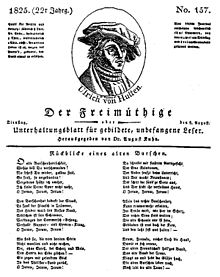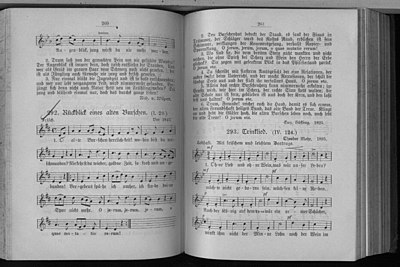O old fellow glory

O old fellowship is the first line (and the later title) of a student song written in the first half of the 19th century , in which the student life of the time is described in retrospect from the perspective of an already working person who wistfully thinks back to his youth. The song was first published in 1825. Its author is unknown. A self-claimed authorship of the doctor and fraternity member Eugen Höfling (1808–1880), recognized in many sources, has been refuted by finding the first publication.
meaning
Due to the popularity of the song in the 19th and 20th centuries, this title has become a catchphrase with which the student years are described in the special form of the student culture typical of Central Europe, as it is only cultivated today by the student associations . This expression can be found as a book title, as the title of sound carriers and two German cinema films from 1925 and 1930. Images and graphics that deal with traditional student life are also often given this title.
Today the song is an integral part of the repertoire of student songs sung by student associations and is printed in the general German Kommersbuch .
The song was translated into Swedish in the 1920s: O, gamla Klang- och jubeltid ("O old sound and jubilation time"). It is still very popular among Swedish students today. It has also been translated into Dutch, Estonian and Latvian, and it is still often sung today at fraternity parties.
content
The verses revolve around aspects of student and corporate life and glorify it as a happy and untied time.
- O old lad glory
- Where did you disappear to (later also: disappeared )
- You will never come back, golden age
- So happy, so free! (later also: and unbound )
In the sense of the classic Ubi sunt topos, the good old days are missed, the present described as dreary and forced.
- In vain do I look around
- I can't find your trail anymore.
- O jerum, jerum, jerum,
- O quae mutatio rerum (later addition)
The refrain O jerum, jerum, jerum is derived from the Latin Jesu domine (cf. also o jemine ) and is an outdated exclamation of fear and lament.
The question of the behavior of two boys meeting on the street was a problem discussed in many Comments around 1830 . A line from the song also refers to this.
- Where are they, those of the broad stone?
- Didn't sway and didn't give way [...]?
The lyrics in full (4a and 4b are later insertions):
1.
- O old lad glory
- where have you disappeared to
- You'll never come back, golden days
- so happy and unbound!
- In vain do I look around
- I can't find your trail anymore
- O jerum, jerum, jerum,
- o quae mutatio rerum!
2.
- The dust covers the lady's hat,
- the booze sank into ruins,
- the bat was robbed of the rust,
- hereditary is its shimmer,
- the Kommersgesang faded away,
- The rapier and spore sound fades away.
- O jerum, jerum, jerum,
- o quae mutatio rerum!
3.
- Where are they, those of the broad stone?
- did not stagger or give way,
- those without moss with jokes and wine
- resembled the Lord of the earth?
- They pulled with downcast eyes
- back to the Philistine country.
- O jerum, jerum, jerum,
- o quae mutatio rerum!
4th
- There writes with a gloomy official face
- the one relation,
- the other sighs during class
- and he makes reviews,
- he scolds the sinful soul,
- and he mends her dilapidated house.
- O jerum, jerum, jerum,
- o quae mutatio rerum!
4a.
- Tensioning and screwing on the desolate route
- the crosshair of the one
- the other sighs at the block association,
- and he puts bricks;
- he cooks sugar juice from beets
- and horse power from water.
- O jerum, jerum, jerum,
- o quae mutatio rerum!
4b.
- One of them runs quickly to the stock market
- for doing business,
- the other is sitting at the current account
- and he uses foreign powers;
- who imported from Turkestan
- and he drills his debtors.
- O jerum, jerum, jerum,
- o quae mutatio rerum!
5.
- Just the right lad's heart
- can never get cold;
- seriously, as here in jest,
- the right mind always prevail;
- only the old bowl is far away
- we still have the core,
- and let's hold it tight
- and let's hold on tight!
6th
- So friends! Reach out your hand
- so that it renews itself
- the sacred bond of old friendship,
- the old bond of loyalty.
- Clink glasses and raise glasses
- the old boys are still alive
- the old loyalty still lives
- the old loyalty is still alive!
melody

The melody was taken from the older student song What am I starting, poor devil ; the reference to this melody was first given in Braun's song book for students , Berlin 1843. The once relatively neglected poem only became popular through singing to catchy melodies, of which this prevailed as the only one.
Lore history

The first printed copy of the song can be found in the Berlin magazine “Der Freimüthige, or entertainment newspaper for educated, impartial readers, published by Dr. August Kuhn ”of August 9, 1825 under the title“ Retrospectives of an Old Boy ”. This publication was forgotten again. The author and origin of the song were considered unknown for a long time.
At the 350th anniversary celebration of the University of Marburg in 1877, the Marburg fraternity councilor Sanitätsrath Dr. med. Eugen Höfling as the author of this song. He said he wrote the song between the years 1830 and 1839 and first published it in the Frankfurter Didaskalia ("Didaskalia or Leaves for Spirit, Mind and Publicity." Frankfurt a. M., 1st year 1823).
This unsubstantiated claim was held to be true for a long time, Eugen Höfling went down in literature as the author of the song and received numerous honors.
The authorship was first doubted by Wilhelm Erman, who rediscovered the first publication from 1825 in the winter semester 1890/1891 and published his findings. At the time of this actual first publication, Höfling (born October 15, 1808, died July 21, 1880) was a sixteen-year-old "Lyzeist", that is, a student at the grammar school in his home town of Fulda . It is considered unlikely that a Unterprimaner from East Hesse could write such a mature poem with such great public impact on a subject that required the perspective of an old man and then published it anonymously far from his home in Berlin . Höfling had also admitted that when he was at school, student life with its typical culture, as described in detail in the song, was still completely alien to him. In addition, there are linguistic references in the text to an origin in Halle an der Saale , the place of publication in Berlin indicates a university town in the Prussian territory. Höfling only studied years after the actual first publication, namely in Marburg and Würzburg . An actual publication of the song in the Didaskalia, as claimed by Höfling, has not yet been proven.
Nevertheless, Höfling is still considered an author in many publications. In Marburg there was a memorial plaque at the house at Wettergasse 16 until about 2006, in Eschwege and Fulda there are memorial plaques for courtiers as song poets; the last was unveiled in 1983.
Imitations and parodies
Due to the great popularity and widespread use of the song, it was also suitable as a template for parodies of student life at the time. The songbook for female students was published in Strasbourg in 1910 , in which some typical student songs were rewritten for the female gender:
The opening stanza refers to the women’s studies, which were unfamiliar to many at the time, and not least the first female connections .
- O young maiden glory
- O young maiden glory
- What new gays!
- Relate to you all far and wide
- The universities!
- In vain do I look around
- I can't find a housewife anymore!
- (O jerum, jerum, jerum
- O quae mutatio rerum!)
However, at the end of these verses it stays with the old , which became proverbial with the song.
In 1926 , the Maidenblatt , the association magazine of the Reifenstein schools , which are important for women's education and home economics as a subject in Germany, titled O old Maidenherrlichkeit, a suitable song text for the 25th anniversary of the Obernkirchen Economic Women's School .
In the early days of football in Germany , which was practiced in particular by the prospective academics at the technical universities, some of the football fans transferred student customs and songs to their new sport, but as athletes distanced themselves from the classic liaison operation. The song of lad glory became too
- O wonderful football game
- you most beautiful game of youth
- to play you well is my goal
- that is the highest virtue
- there are all sorts of games
- where you can have fun
- but all must give way
- unequaled football
Movies
- O old lad glory , 1925, direction and script: Helene Lackner, Eugen Rex , silent film in black and white
- O old Burschenherrlichkeit , 1930, director: Rolf Randolf , book: Georg C. Klaren , sound film in black and white
In the film The Recent Thunderstorm by Roy Andersson from 2008, O, gamla toned och jubeltid is used in one scene .
Web links
- Norbert Nail: O quae mutatio rerum! - Facts and assumptions about the authorship of the song "O old boys' glory"
- Eugen Höfling - fraternity member and democrat in the 19th century
- Film "O old lad glory" 1925
- Film "O old lad glory" 1930
- Video: Gerd Durst sings "O old lad glory"
Individual evidence
- ↑ http://www.duden.de/rechtschreibung/jerum
- ↑ Student song : O old lad glory. Retrieved May 3, 2018 .
- ^ O old lad glory // An old lad's review. Research Center for Franconian Folk Music, accessed on March 30, 2019 .
- ↑ Eugen Höfling was born on October 5, 1808 in Fulda. He attended grammar school in his hometown and studied at the universities of Marburg, Würzburg, Prague and Vienna. After a brief assistant professorship in Heidelberg, he returned to Hesse and settled as a general practitioner in Eschwege, where he died in 1880. (Source: Innsbrucker Nachrichten, October 8, 1908, page 9)
- ↑ [1] 01.12.1994Berlin's student union Lysistrata has nothing in mind with fencing Oh, Mädchenherrlichkeit By Maike Sutor
- ^ Das Maidenblatt, October 5, 1926, Volume 11, No. 19
- ^ Christiane Eisenberg: Football in Germany 1890-1914. A parlor game for the middle class. In: Geschichte und Gesellschaft, 20th year, issue 2/1994, pp. 184ff
- ↑ http://www.seiten.faz-archiv.de/faz/19940622/f19940622fuba---100.html With a false beard half right When the relaxed bourgeoisie sifted offside: O wonderful football game, Frankfurter Allgemeine Zeitung, June 22nd 1994, No. 142, p. N5 Humanities
- ↑ "Fußball Sang und Klang", song book for the footballers in the Arbeiter- Turn- und Sportbund, 1920 in the Arbeiter-Turnverlag AG Leipzig.
